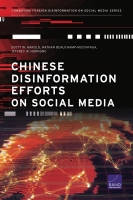The Chinese military's focus on information warfare is expanding to include information operations on social media. Given the possibility of U.S.-China conflict over Taiwan or another regional contingency, understanding how the People's Liberation Army (PLA) thinks about the use of disinformation campaigns on social media has emerged as an important question for U.S. national security policymakers and defense planners. This report describes how the PLA might direct social media disinformation campaigns against the United States and its armed forces, especially the U.S. Air Force. The authors conducted interviews with regional experts during three trips to Asia and reviewed Chinese-language writings and analyses of publicly attributed, or at least reasonably suspected, examples of Chinese disinformation and other malign social media activity on both Chinese and foreign platforms. The authors identify key Chinese practices and the supporting infrastructure and conditions needed to engage in successful social media disinformation campaigns and conclude that China is using Taiwan as a test bed for developing attack vectors. The authors recommend being competitive in shaping and countering messages on social media, working to engage and protect Chinese-American service members (China's most likely targets), and incorporating adversary social media disinformation into future wargames.
Key Findings
China is treating Taiwan as a test bed for developing attack vectors using disinformation on social media.
To date, in the case of Taiwan, China's use of disinformation has achieved mixed and somewhat limited results that are primarily in the political, not operational, domain.
China has not carried out substantial disinformation attacks on other U.S. allies or partners (such as Singapore, the Philippines, or Japan).
Nonetheless, as Chinese disinformation during the COVID-19 crisis has shown, Chinese disinformation campaigns will likely be used to target the United States in the event of a crisis or conflict. As China moves to incorporate social media further into its military operations, it will increasingly engage in some level of shaping operations during what Western observers would consider the preconflict stage.
Should outright kinetic exchanges appear imminent or actually occur, an elevated level of disinformation should be expected, accompanied by messages aimed at such key groups as senior political and military leaders, service members and their families, and base-hosting communities.
Given China's control over the Chinese-language social media platform WeChat and a general belief among China authors that the global ethnic Chinese diaspora is a favorable vector of influence for Beijing to leverage, China will likely seek to communicate directly with Chinese-American military officers and personnel and their families, attempting to turn them against any U.S. policies or operations that China finds objectionable.
Chinese disinformation efforts also will likely seek to introduce information that is difficult for the United States to definitively refute, either because doing so would require revealing classified information or because it is impossible to disprove a negative.
Recommendations
The Air Force should incorporate adversary social media disinformation into wargaming.
The Air Force should engage communities around U.S. bases and overseas military installations to build trust.
The Air Force should raise awareness of PLA malign activity online.
The joint force and/or the U.S. government should train the joint force and the broader Department of Defense workforce to recognize and resist foreign (and in this case, specifically Chinese) disinformation campaigns.
The joint force and/or the U.S. government should explore the advantages and opportunities of using human versus technological solutions to identify and possibly counter or defeat disinformation efforts.
The joint force and/or the U.S. government should establish a trusted presence in all important social media platforms used across the Indo-Pacific as a way to compete in the information domain.
The joint force and/or the U.S. government should establish a presence on Chinese-language social media platforms so as not to cede these valuable communications territories to the PRC government uncontested.
The joint force and/or the U.S. government should engage Chinese-American and Taiwanese-American military personnel and provide them with resources to identify and defeat Chinese disinformation operations that they might be exposed to.
The joint force and/or the U.S. government should engage with allies and/or partners to share information and best practices for identifying and countering Chinese disinformation on social media.
The joint force and/or the U.S. government should assess where best to allocate scarce resources—countering Chinese disinformation operations or responding to other forms of Chinese influence and interference operations.

No comments:
Post a Comment